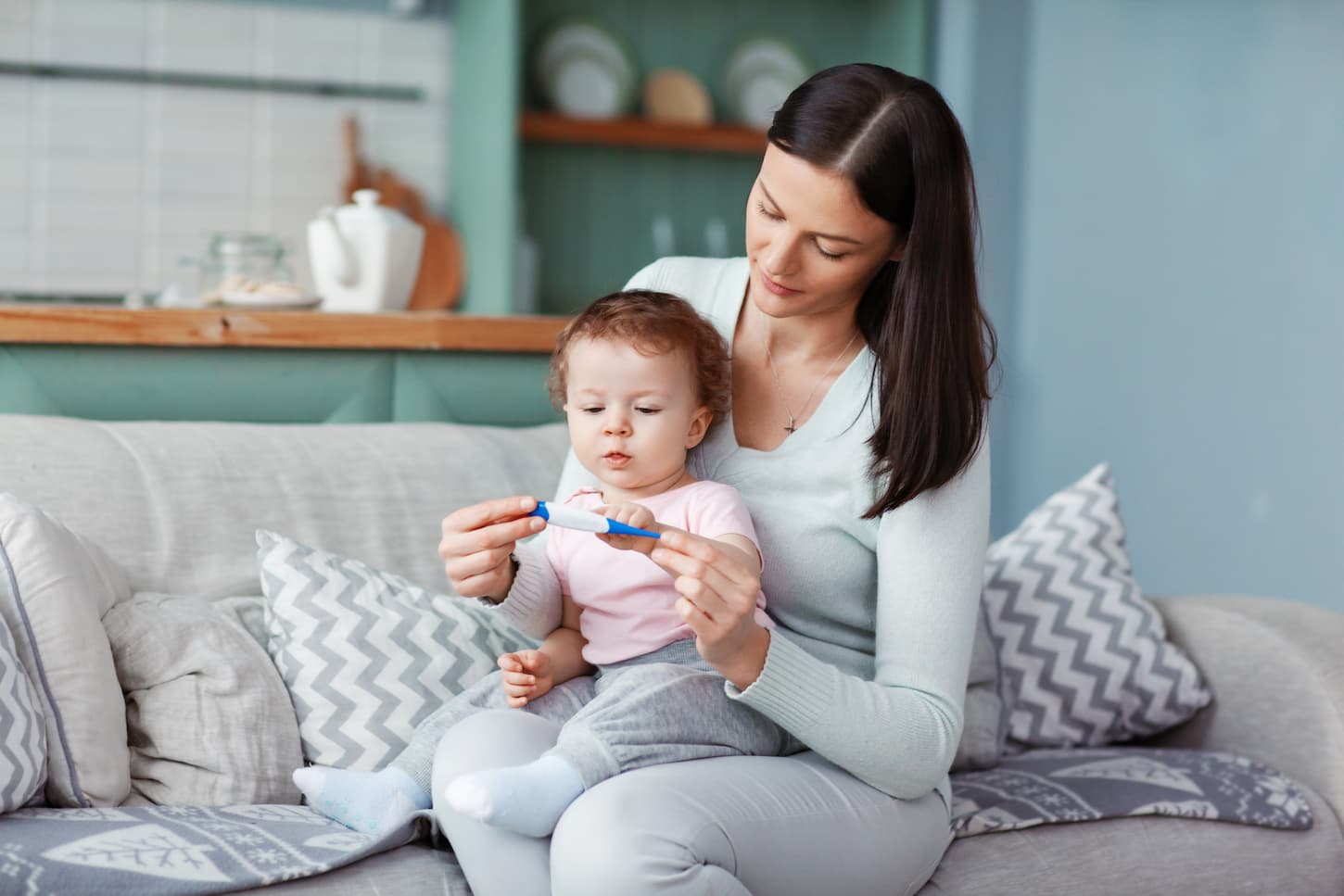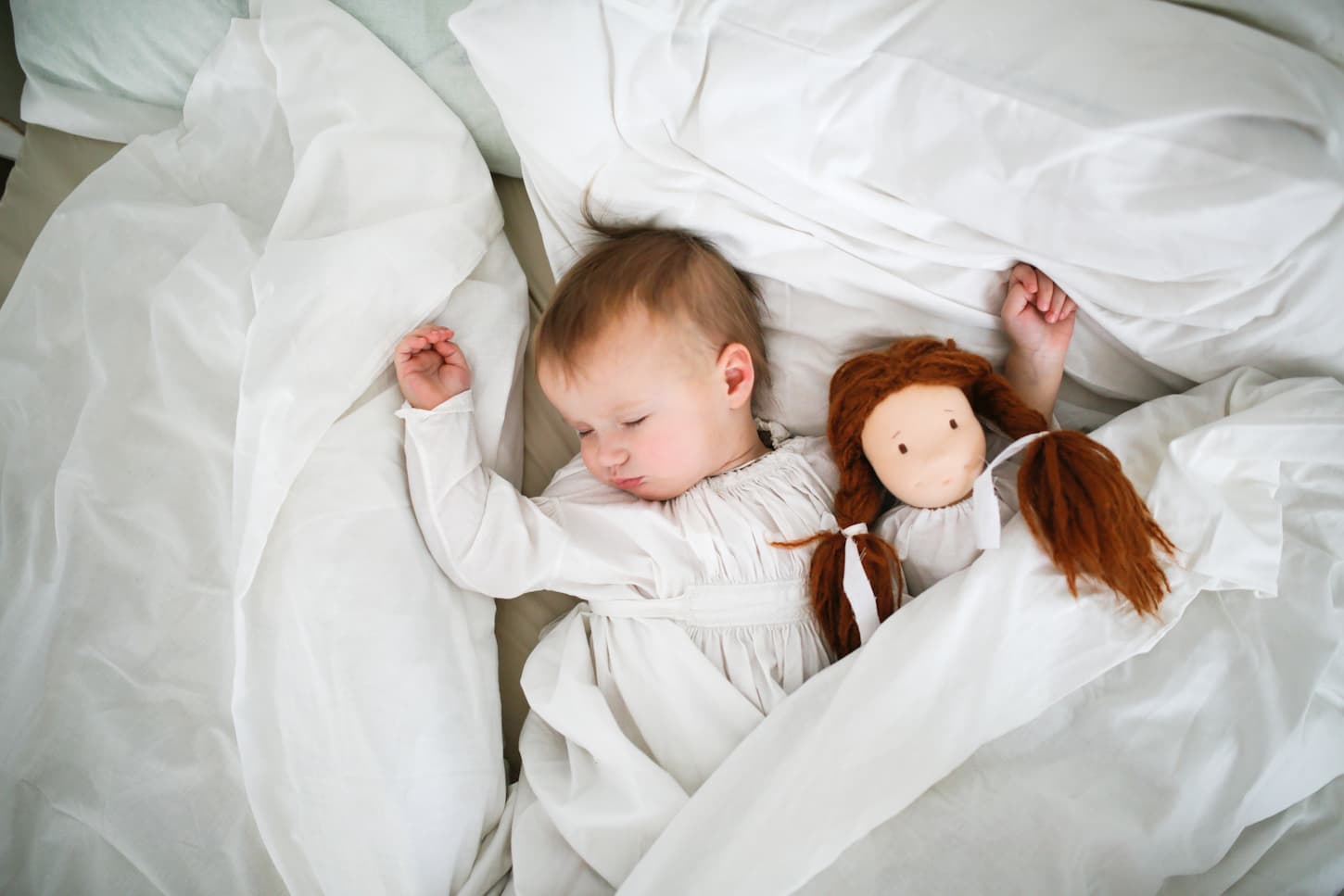When your baby is sick, they need more sleep than normal to be able to recover. There are many ways you can help your baby sleep easier while sick, but you may be asking yourself, can I let my sick baby sleep with me?
Doctors generally recommend that a baby should not sleep in their parent’s bed when they’re sick, as babies are more susceptible to SIDS while bed-sharing. Bed-sharing can also disrupt an already well-established sleeping routine and can cause babies to lose the sleep they need to heal.
Now, if you’re already co-sleeping with your baby? Then letting them sleep with you while they’re ill is probably the only way that anyone will (realistically) get some sleep. It’s when you aren’t already cosleeping (as safely as possible) that moving to that can introduce less sleep for everyone involved.
Simply put, there are safer ways to help your child sleep better while they are sick.

Can I Let my Sick Baby Sleep with me?
Doctors and health care providers generally do not recommend that parents co-sleep with children, even when the children are ill. In reality, though, many parents co-sleep with sick children as it offers additional comfort to the child.
No one wants to see their baby sick. To lessen their suffering and overall total time spent ill, and to make sure they are well taken care of at night. You’re going to want to do everything you can to make sure they get a good sleep and feel better.
A baby should always sleep on their backs on a firm mattress (you can read why in my article here), with little else in their crib, even when they are sick. That’s the official position taken by pediatricians and the American Academy of Pediatrics. As a registered nurse, I’ve seen the data and it’s a solid general rule and position.
Babies, especially sick ones, don’t have a lot of mobility, and can’t get themselves into different positions easily. When they sleep in your bed, they are at greater risk for suffocation, if they get stuck in a groove created by the soft mattress. At best, this will disrupt their sleep, and they might cry out and wake you. At worst, soft beds have been linked to cases of Sudden Infant Death Syndrome.
Though you may want to give them as many cuddles as you can, you should do so before you put them down. Give them a little longer of a cuddle than normal before you put them down, but their own crib will always be the safest place for them to sleep, even if they are sick.
If you want to keep a close eye on them, you can either move their crib into your room or sleep in their room, so as not to disturb their sleep routines.
Another solution could be a baby monitor, such as this Baby Monitor with Remote Pan-Tilt-Zoom Camera available on Amazon. This allows your baby to sleep in the environment they’re used to, and you can keep an eye on them in case they need anything while sleeping in the comfort of your own bed.

How Can I help my Sick Baby Sleep at Night?
As a parent, it’s painful, knowing there’s no instant cure to offer your baby. But there are ways that you can help them sleep while they’re sick. Here are 6 ways you can help your sick baby sleep better.
- Give them a massage
- Keep your baby hydrated
- Use a cold humidifier
- Cuddles
- Medicine
- Offer extra sleep
Try using one or more of the following remedies to help your sick baby sleep through the night. You may even want to combine several tips for a more restful night’s sleep, depending on what illness your baby has.
Tip #1: Give your baby a massage
If your body aches when you’re sick, your baby’s body likely does too. Coughing a lot during the day, and shaking when the fever has taken over, all contribute to feeling sore throughout the body.
Make sure to speak with your doctor before using any lotions on your child, to make sure it is suitable for them. But after giving your baby a nice warm bath, and then massaging them with vapor rub or calming lotion, your baby’s muscles or congestion will start to feel much better.
If your baby is more relaxed, they should be able to sleep better, and if you’re using vapor rub as well, it should help to relieve congestion, which will allow them to breathe easier during the night.
Tip #2: Keep your baby hydrated
Making sure your baby is well hydrated during the day, and right before bed, is another good way to ensure they get a good night’s rest. It’s easier said than done, but try to encourage your baby to ingest a little more fluids into their diet when they’re sick, any way you’re able to do so.
Being hydrated will also help with lessening congestion, and allowing mucus to be coughed out of the body. The less congested your baby is, the easier it will be for them to breathe, and they will sleep easier.
Tip #3: Use a humidifier
Using a cool humidifier can also help your baby, as it helps with coughing. If they are not coughing as much, they will be able to fall into a deeper sleep, and finally, get the rest they need to feel better.
Another benefit of cool humidifiers is that they help to naturally keep your baby’s fever down, and not let them overheat during the night.
Our recommended humidifier has over 10,000 five-star ratings on Amazon and was specifically designed for your baby’s nursery. It is the AquaOasis Cool Mist Humidifier (click here to see it on Amazon). We have an older version of it, and it’s worked great for us and our children.
Tip #4: Offer extra daytime cuddles
One thing you’re likely to want to do when your baby is sick is to give them extra cuddles. Good news: giving your baby extra attention and a longer cuddle before bed will help to calm them, and will hopefully help them to fall asleep easier.
Skin-on-skin contact through cuddling can also help the baby’s body to self-regulate, using your body to help your baby’s body to stabilize their heartbeat and breathing patterns.
However, beware that babies might not sleep well in your arms as they are not used to it, or will not be able to get into as deep of sleep in that position. So, it is important to not give them too many cuddles, but rather just enough to calm them and let them sleep easier in their own beds.
Tip #5: Give your child medicine as directed
With the approval from your doctor, exact dosages of medicine, such as baby Motrin or Tylenol, will also be able to help them sleep better. It will focus on the primary source of their discomfort, and alleviate it for a set amount of time, letting your baby be able to relax and sleep through it.
Make sure to only provide the exact dosages recommended by your doctor, as over-medicating your baby can have negative effects as well.
Nurse’s tip: Medicines like Tylenol and Motrin do not cure an illness – they only help manage the symptoms for a few hours (up to 6-8 hours). So when they wear off, your child may need another dose in order to stay comfortable.
Tip #6: Offer your baby extra rest or sleep time
This is not a way to help your baby sleep at night, but rather a suggestion to make sure they get enough sleep while they are sick. Sleep helps heal sickness for all ages, including babies. While you don’t want to completely ruin your baby’s sleep schedule, offering them extra sleep can help them heal better.
If this means starting their bedtime routine earlier or offering them an extra nap or two during the day, your baby will begin to feel better quicker with the extra sleep in their system.
While you should never let your baby sleep with you, there are ways to help them sleep better when sick. A combination of any of the above should help them to sleep easier, and hopefully, feel better sooner.
And just because this next question is so commonly asked, here’s the answer to it in an article I wrote titled: Should a Sick Baby Sleep All Day? So go give that a read next, because there are some important nuances beyond the spoiler answer of “your baby needs extra rest, but shouldn’t sleep all day.”